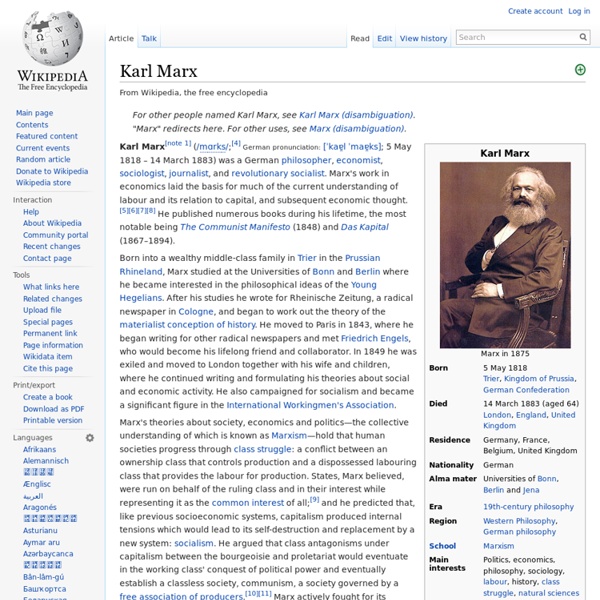Max Weber
Karl Emil Maximilian "Max" Weber (German: [ˈmaks ˈveːbɐ]; 21 April 1864 – 14 June 1920) was a German sociologist, philosopher, and political economist whose ideas influenced social theory, social research, and the entire discipline of sociology.[3] Weber is often cited, with Émile Durkheim and Karl Marx, as among the three founding creators of sociology.[4][5][6] Weber also made a variety of other contributions in economic history, as well as economic theory and methodology. Weber's analysis of modernity and rationalisation significantly influenced the critical theory associated with the Frankfurt School. After the First World War, Max Weber was among the founders of the liberal German Democratic Party. He also ran unsuccessfully for a seat in parliament and served as advisor to the committee that drafted the ill-fated democratic Weimar Constitution of 1919.
W. B. Yeats
Life[edit] Early years[edit] An Anglo-Irishman,[4] William Butler Yeats was born in Sandymount, County Dublin, Ireland.[5] His father, John Butler Yeats (1839–1922), was a descendant of Jervis Yeats, a Williamite soldier, linen merchant, and well known painter who died in 1712.[6] Jervis's grandson Benjamin married Mary Butler[7] of a landed family in County Kildare. At the time of his marriage, John Yeats was studying law but abandoned his studies to study art at Heatherley's Art School in London.[8] His mother, Susan Mary Pollexfen, came from a wealthy merchant family in the county town Sligo, County Sligo, who owned a milling and shipping business. Soon after William's birth the family relocated to the Pollexfen home at Merville, Sligo to stay with her extended family, and the young poet came to think of the area as his childhood and spiritual home.
Émile Durkheim
David Émile Durkheim (French: [emil dyʁkɛm] or [dyʁkajm];[1] April 15, 1858 – November 15, 1917) was a French sociologist, social psychologist and philosopher. He formally established the academic discipline and, with Karl Marx and Max Weber, is commonly cited as the principal architect of modern social science and father of sociology.[2][3] Durkheim was also deeply preoccupied with the acceptance of sociology as a legitimate science.
Friedrich Nietzsche
Friedrich Wilhelm Nietzsche (/ˈniːtʃə/[1] or /ˈniːtʃi/;[2] German: [ˈfʁiːdʁɪç ˈvɪlhɛlm ˈniːt͡sʃə]; 15 October 1844 – 25 August 1900) was a German philosopher, cultural critic, poet, composer and Latin and Greek scholar. He wrote several critical texts on religion, morality, contemporary culture, philosophy and science, displaying a fondness for metaphor[3] and irony. Nietzsche's key ideas include perspectivism, the will to power, the death of God, the Übermensch and eternal recurrence.
Teleology
A teleology (from Ancient Greek telos, meaning roughly "end" or "purpose",[1] and -logia, meaning "study of, discourse") is an account of a given thing's end or purpose. For instance, we might give a teleological account of why forks have prongs by showing their purpose—how the design helps humans to eat certain foods. Stabbing food and helping humans eat is what forks are for.
Sigmund Freud
Sigmund Freud (/frɔɪd/;[2] German pronunciation: [ˈziːkmʊnt ˈfʁɔʏ̯t]; born Sigismund Schlomo Freud; 6 May 1856 – 23 September 1939) was an Austrian neurologist, now known as the father of psychoanalysis. Freud qualified as a doctor of medicine at the University of Vienna in 1881,[3] and then carried out research into cerebral palsy, aphasia and microscopic neuroanatomy at the Vienna General Hospital.[4] Upon completing his habilitation in 1895, he was appointed a docent in neuropathology in the same year and became an affiliated professor (professor extraordinarius) in 1902.[5][6] Psychoanalysis remains influential within psychotherapy, within some areas of psychiatry, and across the humanities.
Immanuel Kant
Immanuel Kant (/kænt/;[1] German: [ɪˈmaːnu̯eːl kant]; 22 April 1724 – 12 February 1804) was a German philosopher who is widely considered to be a central figure of modern philosophy. He argued that fundamental concepts structure human experience, and that reason is the source of morality. His thought continues to have a major influence in contemporary thought, especially the fields of metaphysics, epistemology, ethics, political philosophy, and aesthetics.[2] Kant's major work, the Critique of Pure Reason (Kritik der reinen Vernunft, 1781),[3] aimed to explain the relationship between reason and human experience. With this project, he hoped to move beyond what he took to be failures of traditional philosophy and metaphysics.
the wasteland that was vivienne
The poet wrote: "To her the marriage brought no happiness to me it brought the state of mind out of which came The Waste Land." That line, which comes in a letter published in Volume 1 of Eliot's Collected Letters, led to an awareness that the distance was less great between "the man who suffers and the mind which creates" than had previously been believed. Today, Volume 2 of the Letters (1923-1925) is published along with a revised edition of Volume 1 (1898-1922), edited by Eliot's second wife, Valerie.
Issues in Science and Religion
Issues in Science and Religion is a book by Ian Barbour. A biography provided by the John Templeton Foundation and published by PBS online states this book "has been credited with literally creating the contemporary field of science and religion."[1] Contents[edit]



